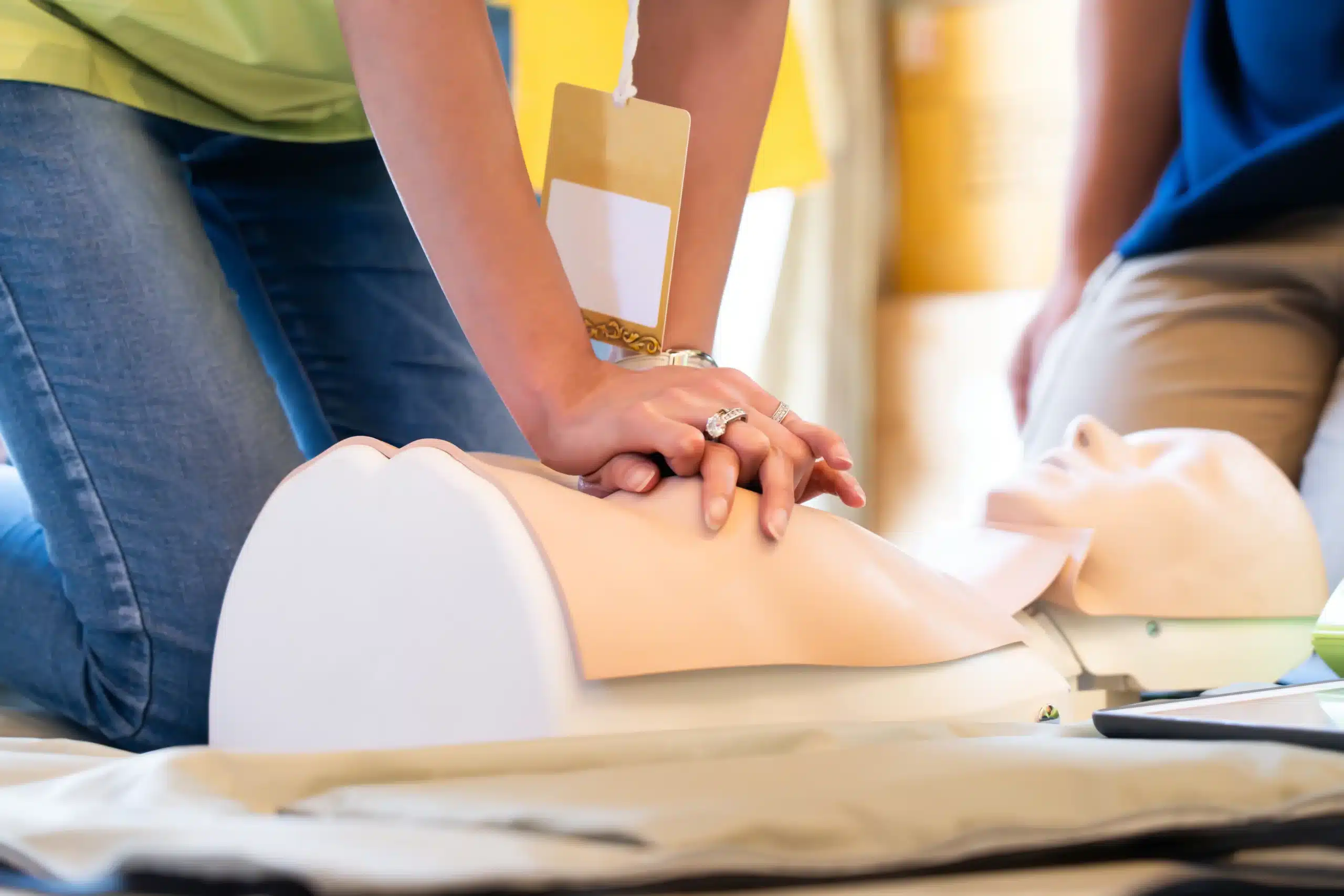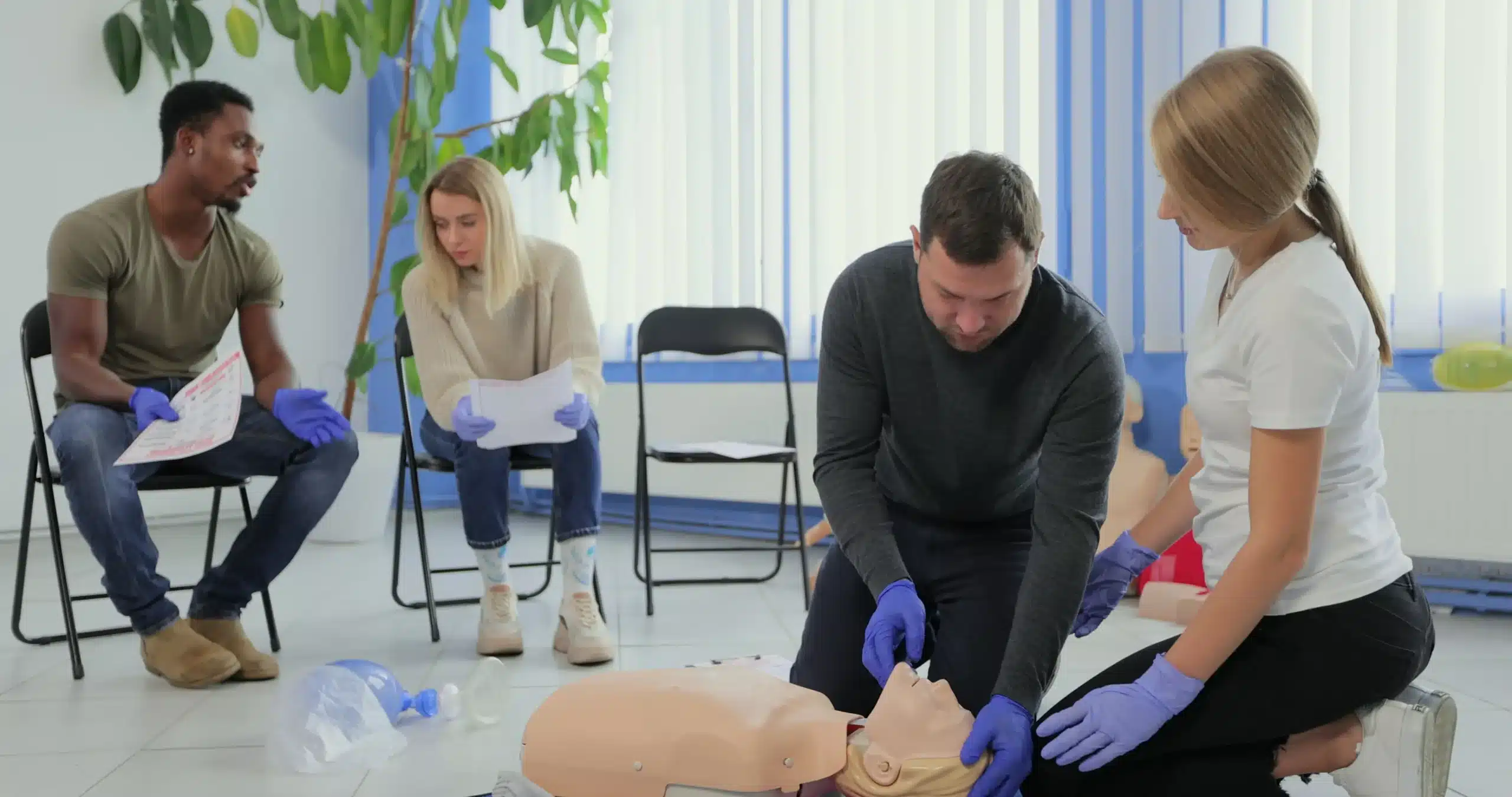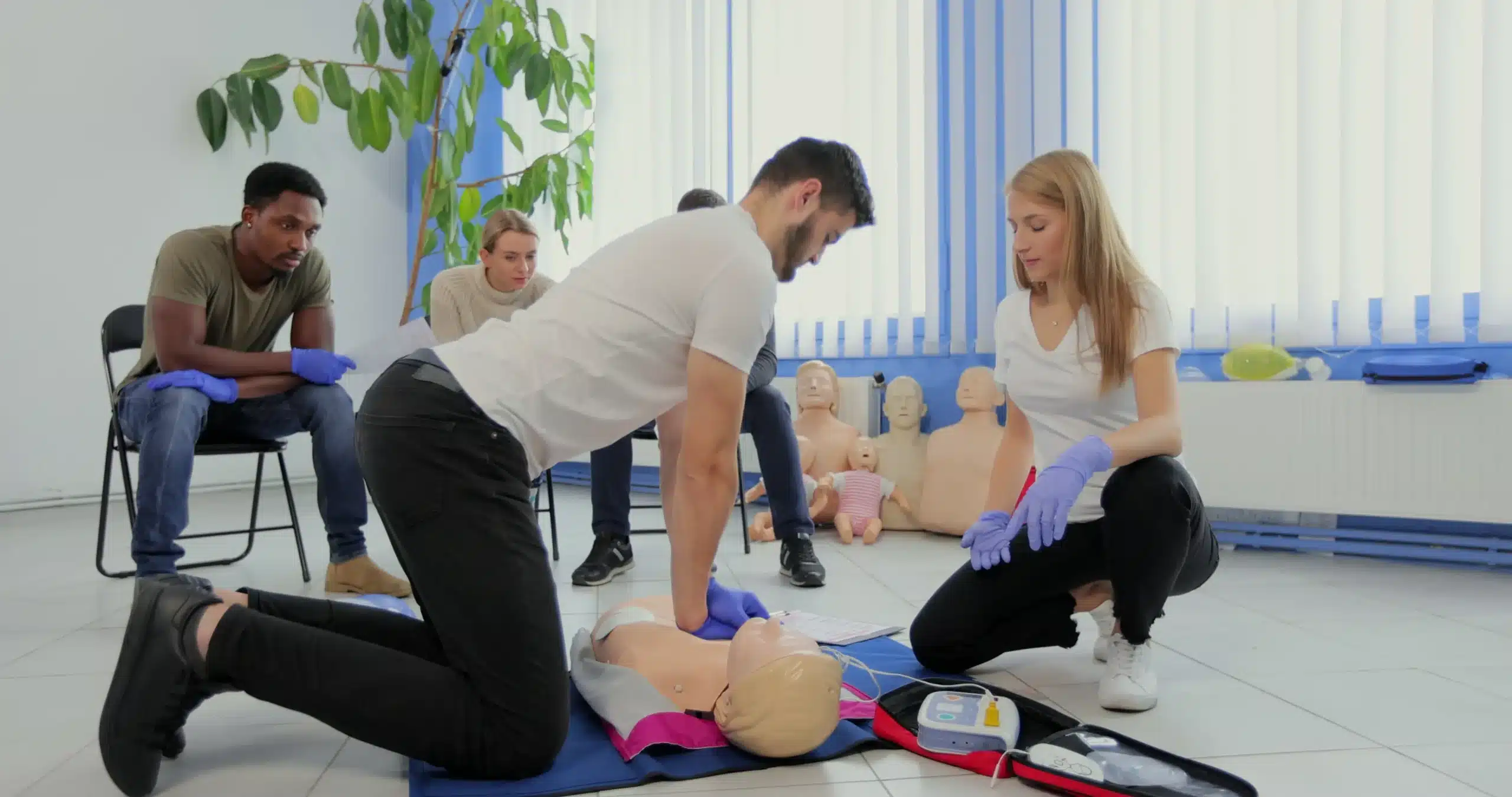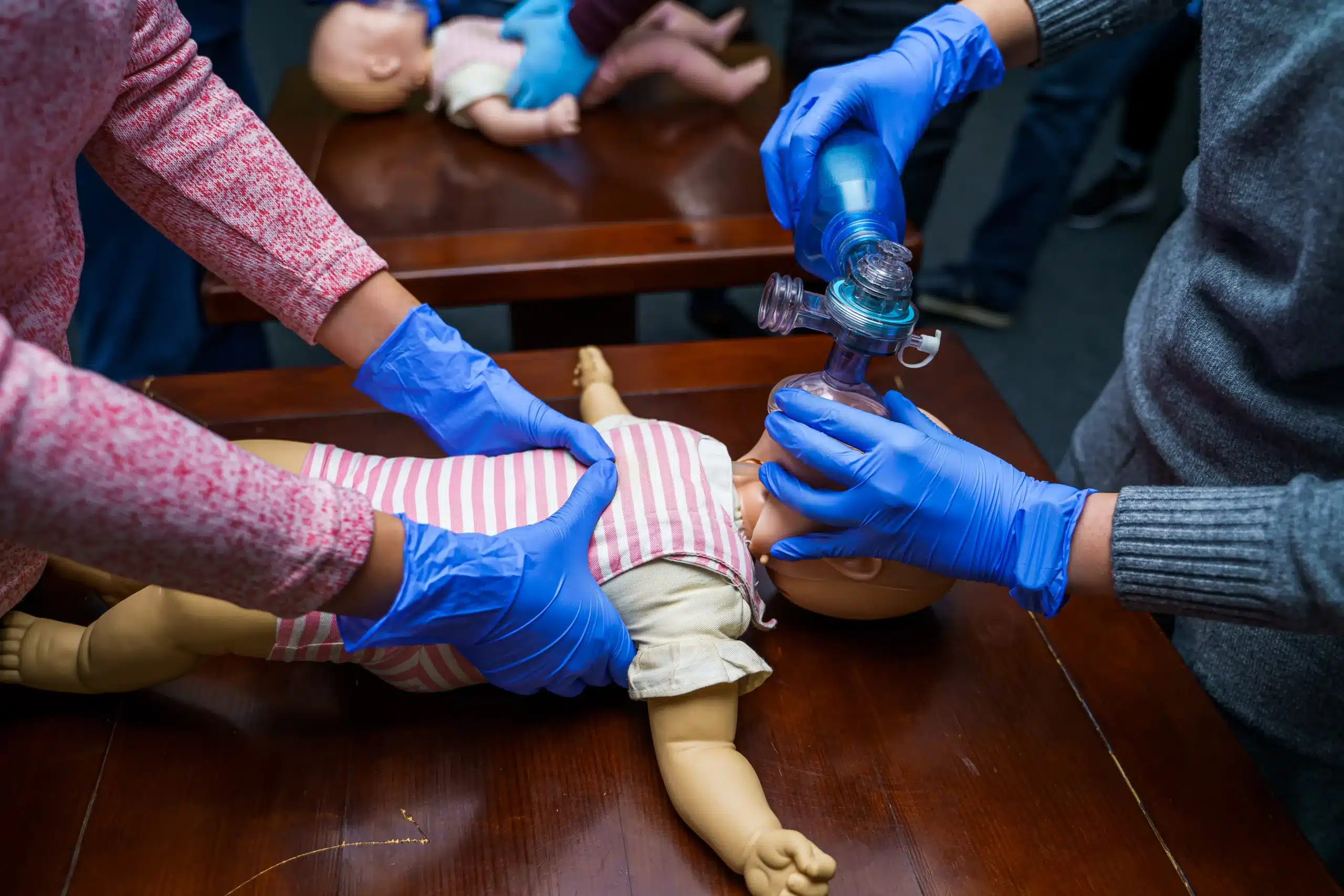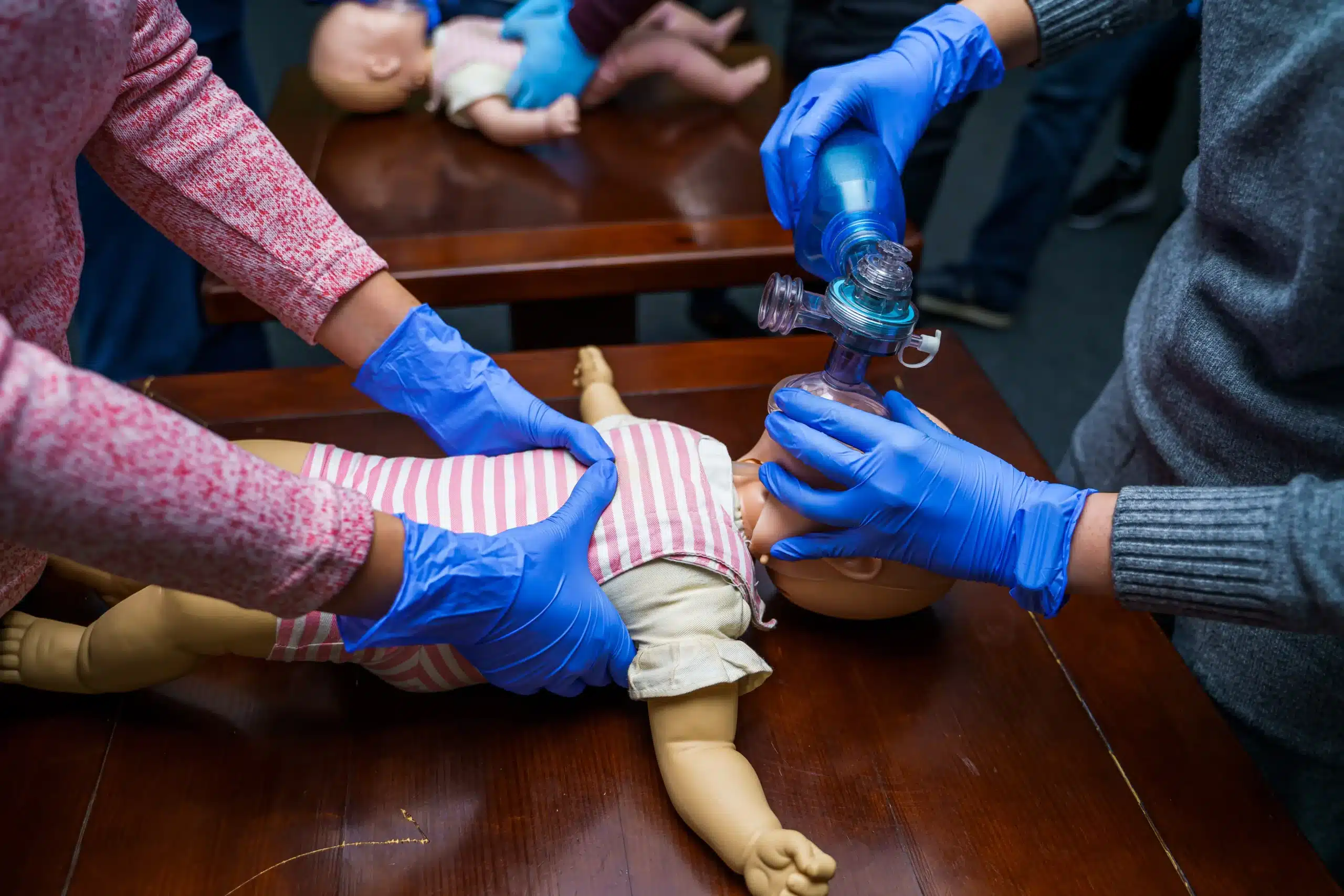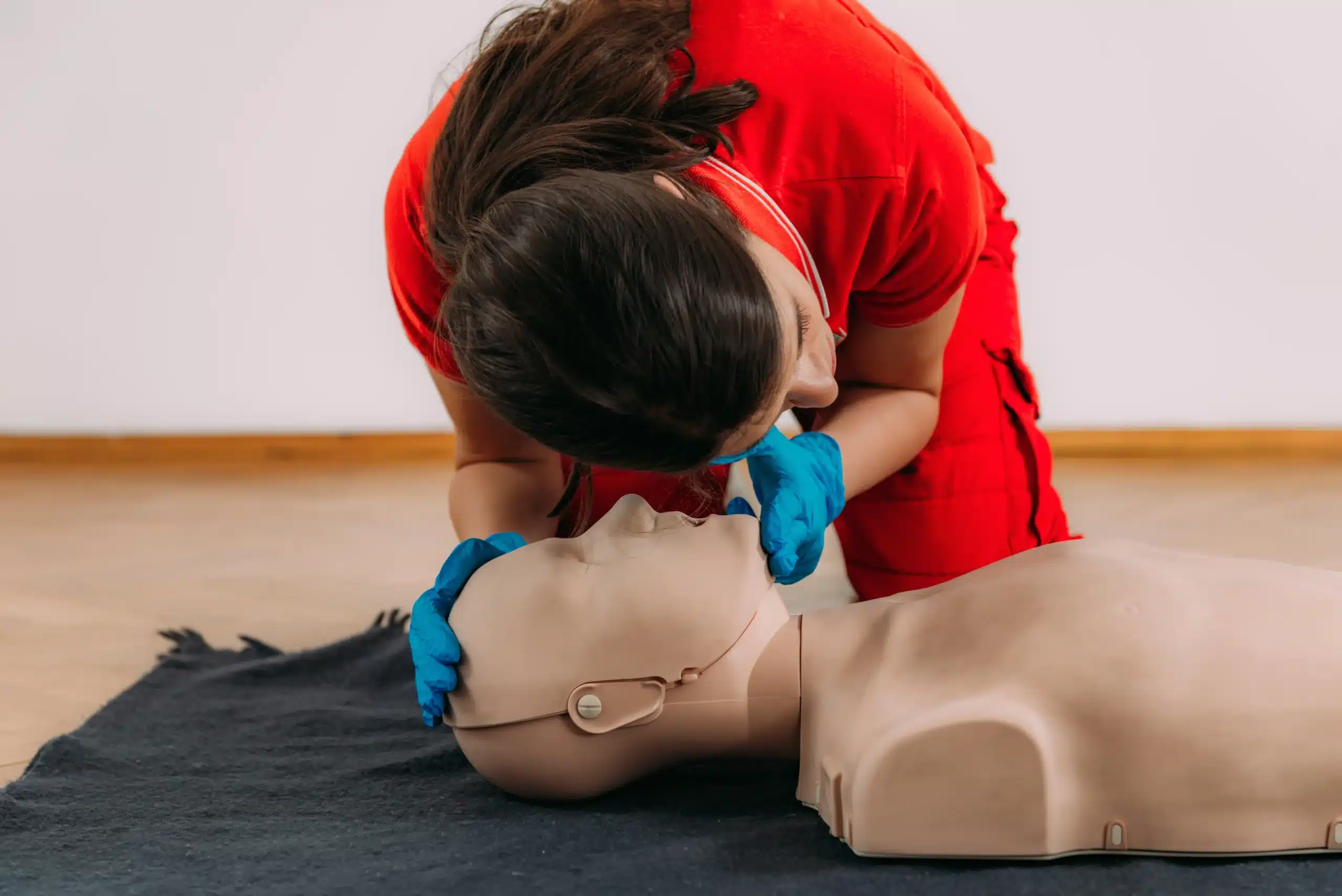Are you a healthcare professional in Turlock looking to enhance your skills in managing cardiovascular emergencies? Advanced Cardiac Life Support (ACLS) certification is more than just a credential—it’s a testament to your commitment to providing high-quality patient care. This article provides a comprehensive overview of ACLS training in Turlock, covering key aspects such as course components, prerequisites, costs, and the process of finding reputable training providers. We’ll also address common misconceptions about ACLS and highlight the importance of staying current with AHA guidelines. Whether you’re a doctor, nurse, paramedic, or other healthcare provider, this guide will help you understand the value of pursuing advanced cardiac life support in Turlock and how it can empower you to make a real difference in critical situations.
Key Takeaways
- ACLS is more than just CPR: It equips healthcare providers with advanced skills to manage a range of cardiovascular emergencies, encompassing everything from airway management to pharmacology. This comprehensive training prepares you for diverse critical situations.
- Choosing the right ACLS course matters: Consider factors like location, schedule, and instructor experience. Look for AHA-aligned programs and ask providers about class size and student outcomes to ensure a high-quality learning experience. Reviewing core concepts beforehand can set you up for success.
- Staying current is key: ACLS certification requires renewal every two years. Maintain your skills and knowledge by completing renewal courses and staying informed about the latest AHA guidelines. This ongoing commitment ensures you’re always ready to provide effective care during cardiac emergencies.
What is Advanced Cardiac Life Support (ACLS)?
What is ACLS?
Advanced Cardiovascular Life Support (ACLS) is specialized training designed to equip healthcare professionals with the skills to manage cardiovascular emergencies. It goes beyond basic life support (BLS) and focuses on a systematic approach to patient care during the first critical moments of a cardiac arrest or other serious cardiovascular event. ACLS covers a range of interventions, including airway management, rhythm recognition, and pharmacological therapies. It’s relevant for professionals like physicians, nurses, paramedics, and respiratory therapists who are likely to encounter these situations. If you are in the Merced, Turlock, or Atwater area, you can find ACLS training courses through Merced CPR Classes.
Why is ACLS Certification Important?
ACLS certification demonstrates a commitment to providing high-quality patient care during life-threatening cardiovascular events. For many healthcare roles, ACLS certification is a requirement. Beyond fulfilling job requirements, holding a current ACLS certification validates your advanced knowledge and skills, increasing your value as a healthcare provider. Regular recertification ensures you stay informed about the evolving best practices for managing cardiac emergencies. This ongoing learning contributes to better patient outcomes and a higher standard of care. For a low-price guarantee on ACLS training, explore the options available at Merced CPR Classes.
Top ACLS Certification Providers in Turlock
Finding the right Advanced Cardiac Life Support (ACLS) certification course is crucial for healthcare professionals. Here’s a look at some providers offering ACLS training in and around Turlock:
Merced CPR Classes
Merced CPR Classes, also known as Safety Training Seminars, is a woman-owned American Heart Association (AHA) Training Center offering a range of AHA courses, including BLS, ACLS, PALS, CPR, and First Aid. They provide training throughout the week in Merced and surrounding areas like Turlock and Atwater. They prioritize high-quality instruction with a commitment to customer service and affordability. Visit their website for the latest schedule and ACLS course details.
Elite Medical Training
Elite Medical Training emphasizes the importance of teamwork, communication, and systems of care within their ACLS courses. Their program covers essential skills such as recognizing and responding to cardiopulmonary arrest, immediate post-cardiac arrest care, acute dysrhythmia, stroke, and acute coronary syndromes (ACS). Learn more about their ACLS certification program in Turlock.
First Lady Permanente
First Lady Permanente offers AHA ACLS training in several locations, including Modesto, Turlock, and Merced. They focus on equipping healthcare professionals with the advanced life-saving techniques necessary for managing cardiac emergencies. You can explore their course offerings on their website.
Safety Training Seminars
Safety Training Seminars, operating in conjunction with Merced CPR Classes, offers convenient daily AHA BLS, ACLS, PALS, CPR, and First-aid certification courses in Turlock and nearby cities. Their regularly updated class schedule is available online, making it easy to find a course that fits your schedule. They are committed to providing high-quality instruction and accessible courses.
ACLS Course Costs & Value
Knowing the price range for ACLS courses helps you budget and compare training options. While cost is a factor, the value of ACLS certification lies in the skills you gain to handle cardiac emergencies effectively.
Initial Certification Costs
Initial ACLS certification courses typically involve more comprehensive training, covering essential skills like CPR, using a defibrillator (AED), managing breathing problems, and responding to heart attacks and strokes. These courses also emphasize teamwork and communication, vital in high-pressure medical situations. Because of the in-depth nature of initial training, expect these courses to be a bit more expensive than renewal courses. Reach out to providers like Merced CPR Classes for specific pricing in your area. For comparison, you can check out First Lady Permanente’s ACLS class details and pricing, noting that their two-day initial ACLS course is priced higher than their one-day renewal.
Renewal Course Pricing
For healthcare professionals already holding ACLS certification, renewal courses refresh your knowledge and skills. These courses are generally shorter, often one day, focusing on updates to guidelines and reinforcing core competencies. As such, renewal courses are typically less expensive than initial certification courses. First Lady Permanente, for instance, offers a one-day ACLS renewal course at a lower price point than their initial course.
Group Discounts & Promotions
If you’re training with a group of colleagues or students, inquire about group discounts. Many training centers, including Merced CPR Classes, offer reduced rates for group bookings. This can be a cost-effective way to ensure your team receives the necessary training. Contact training providers directly to discuss group discounts and tailor a package to your needs. Safety Training Seminars also encourages inquiries about group discounts on BLS and ACLS courses.
Low Price Guarantees
Look for training providers who offer a low-price guarantee. This demonstrates their commitment to providing affordable training without compromising quality. Merced CPR Classes offers a low-price guarantee, giving you confidence that you’re receiving competitive pricing for your ACLS training. Comparing prices and checking for guarantees helps you find the best value.
ACLS Training Prerequisites
Before signing up for an Advanced Cardiac Life Support (ACLS) course, it’s helpful to understand the requirements. Knowing the prerequisites ensures you’re prepared and eligible for the training. This section clarifies what you’ll need, whether you’re pursuing initial certification or renewing your existing ACLS credentials.
Current AHA BLS Certification
A current American Heart Association (AHA) Basic Life Support (BLS) for Healthcare Providers certification is essential for ACLS training. This foundational BLS certification covers core life-saving skills, establishing a baseline level of competence before moving on to the more advanced techniques in ACLS. Think of it as building a strong foundation.
Current AHA ACLS Provider Card (Renewals)
If you’re renewing your ACLS certification, bring your current AHA ACLS Provider card and your current AHA BLS card to the renewal course. This ensures you’re already familiar with the core concepts and allows the renewal course to focus on updates and refinements to existing protocols. Check your card’s expiration date and plan your renewal accordingly.
Other Qualifications
For initial ACLS certification, requirements might vary. Some providers may require an online portion or a pre-course assessment. Check with your chosen training center, like Merced CPR Classes, to confirm their specific requirements. Being proactive and asking questions can save you time and ensure a smooth training experience. Review the course preparation page for more information.
Core ACLS Course Components
This section covers the core components of an ACLS course, from essential skills and knowledge to hands-on practice and simulations. A strong grasp of these elements is crucial for effective patient care in emergencies.
Key Skills & Knowledge
ACLS courses, provided by the American Heart Association (AHA), equip healthcare professionals with the skills to manage cardiopulmonary arrest and other cardiovascular emergencies. These courses cover a range of topics, including recognizing and treating life-threatening arrhythmias, understanding airway management, and mastering effective resuscitation techniques. This foundational knowledge is essential for quick, informed decisions during critical moments. The curriculum emphasizes the importance of high-quality Basic Life Support (BLS) as the cornerstone of advanced cardiac care. For more information on BLS, check out our BLS course.
Hands-on Practice & Simulations
ACLS courses aren’t just about theory; they’re about practical application. Hands-on practice and simulations form a significant part of the training, allowing participants to apply their knowledge in a controlled environment. These simulations often involve realistic scenarios, mimicking the pressures and complexities of real-world emergencies. Participants practice essential skills like chest compressions, AED use, and administering medications using simulation equipment. This immersive experience builds confidence and competence, preparing healthcare providers to respond effectively under pressure. To learn how to prepare for your course, visit our Course Preparation page.
Team Dynamics & Communication
Effective teamwork and communication are paramount in medical emergencies. ACLS training emphasizes clear communication and coordinated efforts within a resuscitation team. Participants learn how to effectively share patient information, delegate tasks, and work together seamlessly to provide the best possible care. These skills are honed through simulated scenarios, where participants practice working as a cohesive unit. This focus on team dynamics ensures that healthcare professionals can function effectively in high-stress environments, optimizing patient outcomes. We offer group discounts for those training together to strengthen their team communication.
Pharmacology & Medication Administration
Understanding the appropriate use of medications in cardiac emergencies is a critical component of ACLS training. The course covers essential pharmacology related to cardiovascular conditions and administering medications in these situations. Participants learn about various drugs used in ACLS, their mechanisms of action, and potential side effects. This knowledge, combined with hands-on practice using simulation equipment, ensures that healthcare providers can confidently and safely administer medications during critical moments. Our low price guarantee makes this crucial training affordable.
Applying ACLS Training
After completing your ACLS certification, you’ll have the skills to handle a range of cardiac emergencies. This training goes beyond basic CPR and equips you with advanced life-saving techniques. Let’s explore how these skills apply in real-world scenarios.
High-Quality CPR Techniques
ACLS emphasizes high-quality CPR as the foundation of successful resuscitation. This involves delivering compressions that are at least two inches deep at a rate of 100–120 compressions per minute. Allowing for full chest recoil between compressions ensures optimal blood flow. Minimizing interruptions and avoiding excessive ventilation are also crucial aspects of effective CPR, as highlighted in this ACLS overview. These techniques maximize the chances of restoring spontaneous circulation.
Effective AED Use
Automated External Defibrillators (AEDs) are essential tools in cardiac arrest situations. ACLS training teaches you how to quickly and effectively use an AED. This includes assessing the patient’s rhythm, delivering appropriate shocks, and coordinating AED use with ongoing CPR. The importance of AED proficiency is often emphasized in ACLS courses. Rapid defibrillation can significantly improve a patient’s chances of survival.
Managing Cardiac Emergencies
ACLS training covers a broad spectrum of cardiac emergencies, extending beyond cardiac arrest. You’ll learn to recognize and manage acute coronary syndromes (ACS), such as heart attacks, and strokes. This includes understanding the symptoms, administering appropriate medications, and providing supportive care. This course description highlights the comprehensive nature of ACLS training. This broader approach prepares you for various critical situations you might encounter in a healthcare setting.
Impact on Patient Outcomes
Ultimately, the goal of ACLS training is to improve patient outcomes. By equipping healthcare professionals with advanced life-saving skills, ACLS directly contributes to better survival rates and reduces the severity of long-term complications. This discussion about ACLS emphasizes its impact on patient care. The ability to effectively manage cardiac emergencies can make a profound difference in a patient’s life.
Prepare for Your ACLS Course
Getting ready for your ACLS course can make a real difference in your performance. This section covers the essentials to help you feel confident and prepared.
Study Materials & Resources
ACLS courses cover critical skills, from high-quality CPR and using a defibrillator (AED) to managing respiratory and cardiac arrest. You’ll also learn how to handle heart attacks and strokes. Many providers, like First Lady Permanente, offer resources to help you study. Check with your chosen provider to see what materials they suggest. Reviewing basic life support skills is also a great starting point.
Tips for Success
Want to ace your ACLS course? Arrive on time! Being more than 15 minutes late could mean you’re dismissed from the class, according to First Lady Permanente. Passing requires an 84% score on the written exam and successful completion of all required scenarios. Focus on understanding the concepts to truly grasp how to apply them in real-life situations.
Resuscitation Quality Improvement (RQI) Program
The American Heart Association’s RQI program offers a streamlined way to maintain your certifications. It’s a great option for healthcare professionals looking to keep their BLS, ACLS, and PALS skills sharp. Providers like Turlock CPR Classes often partner with organizations like Safety Training Seminars to deliver these refresher courses.
Maintain Your ACLS Certification
Once you’ve earned your ACLS certification, staying current is key. ACLS certification isn’t permanent. Regular renewal ensures you’re up-to-date on the latest life-saving techniques and AHA guidelines. This not only maintains your credentials but also helps you provide the best possible care.
Renewal Process & Timeline
Your ACLS provider card is valid for two years. Before it expires, you’ll need to complete a renewal course to maintain your certification. Don’t let your skills lapse—staying proactive with your renewal ensures you’re always prepared for cardiac emergencies. Check with your certifying body, like the American Heart Association, for specific renewal requirements and deadlines. Merced CPR Classes offers ACLS renewal courses to help you stay current.
Continuing Education
Many ACLS renewal courses offer continuing education (CE) units. Successfully completing a renewal course can earn you CE credits, which can be valuable for professional development and may be required for maintaining other licenses or certifications.
Stay Current with AHA Guidelines
Staying informed about the latest AHA guidelines is crucial for providing effective advanced cardiac life support. These guidelines are regularly updated to reflect the latest research and best practices. By staying current, you’ll be equipped with the most effective strategies for managing cardiac emergencies and improving patient outcomes. Consider subscribing to AHA publications or taking refresher courses to stay on top of any changes.
Choose the Right ACLS Provider in Turlock
Finding the right Advanced Cardiovascular Life Support (ACLS) provider is crucial for healthcare professionals in Turlock. With several training centers available, it’s important to consider key factors to ensure you receive high-quality, American Heart Association (AHA) compliant training.
Factors to Consider
Location and scheduling are often top priorities. Think about how a training center’s location and class schedule fit with your personal commitments. Consider local options like Safety Training Seminars, a woman-owned business. Turlock’s medical institutions, including Emanuel Medical Center, also sometimes offer ACLS courses. If you’re looking for flexibility, find out if a provider offers online or blended learning options in addition to traditional classroom courses. Finally, check if the training center is an official AHA Training Center, like Turlock CPR Classes, to ensure the curriculum meets the latest AHA guidelines.
Questions to Ask Providers
Before committing to an ACLS course, gather information. Ask potential providers about their instructor qualifications. Experienced instructors can significantly enhance your learning. Inquire about the class size. Smaller classes often allow for more personalized instruction and interaction. Don’t hesitate to ask about the provider’s course completion rates and student feedback. This information can offer insights into the effectiveness of their training programs. Also, confirm the provider uses current AHA-aligned curriculum and materials, ensuring you’re learning the latest resuscitation techniques. Finally, clarify what’s included in the course fee, such as study materials and certification cards.
Importance of AHA-Aligned Curriculum
Choosing an ACLS course with an AHA-aligned curriculum is essential for healthcare providers. AHA ACLS courses equip healthcare professionals with the knowledge and skills to manage cardiovascular emergencies. The curriculum covers essential topics like high-quality CPR and effective AED use. A standardized, AHA-aligned curriculum ensures consistency in training and adherence to the latest evidence-based practices. This prepares you to handle real-life emergencies and demonstrates your commitment to patient care. ACLS certification shows your dedication to staying current with advancements in resuscitation science. It’s an investment in your professional development and, ultimately, benefits your patients.
Common ACLS Training Misconceptions
It’s easy to get confused about Advanced Cardiac Life Support (ACLS) training. Let’s clear up a few common misconceptions.
Who Needs ACLS Certification?
One common misconception is about who actually needs ACLS training. It’s true that not everyone in healthcare requires this specialized knowledge. ACLS certification is primarily for healthcare providers regularly involved in managing cardiopulmonary emergencies. Think doctors, nurses, paramedics, respiratory therapists, and other professionals who are likely to be first responders in these critical situations. If your role involves direct patient care in settings where cardiac arrests are a possibility, ACLS certification is likely essential. Learn more about our ACLS courses.
ACLS Course Difficulty
Another misconception is that ACLS certification is incredibly difficult. While the course is comprehensive and covers complex material, it’s definitely manageable with the right preparation. Medtigo points out that many people successfully complete ACLS training and become certified. Reviewing the course materials beforehand and focusing during the training sessions can significantly increase your chances of success. Don’t let the perceived difficulty discourage you from pursuing this valuable certification. We also offer group discounts to make training more accessible.
ACLS Scope Beyond CPR
Some people assume that ACLS is simply an advanced form of CPR. While high-quality CPR is a critical component of ACLS, the training covers a much broader scope. ACLS protocols encompass a range of interventions, from airway management and rhythm recognition to pharmacological therapies and team dynamics during resuscitation efforts. It’s about understanding the systematic approach to managing cardiac emergencies, not just performing chest compressions. This comprehensive approach is what makes ACLS so vital for improving patient outcomes. Check out our low price guarantee.
Related Articles
- BLS ACLS Classes in Merced CA: Your Guide – Merced CPR Classes
- AHA ACLS Classes in Merced, CA – Merced CPR Classes
- CPR Certification in Merced: Your Complete Guide – Merced CPR Classes
- Debunking Common CPR Myths Save Lives with Facts
- Why CPR is a Lifesaving Skill in Healthcare
Frequently Asked Questions
What exactly does ACLS training cover?
ACLS training goes beyond basic CPR to equip healthcare professionals with advanced skills for managing a range of cardiovascular emergencies. You’ll learn how to recognize and treat life-threatening heart rhythms, manage airways effectively, and administer appropriate medications during critical situations. The training also emphasizes teamwork and communication, essential for coordinating care during emergencies.
How much does ACLS certification cost?
The cost of ACLS certification varies depending on whether you’re taking an initial course or renewing your existing certification. Initial courses tend to be more expensive as they cover more comprehensive material. Renewal courses are typically shorter and more affordable. Many providers offer group discounts, so check with your chosen training center for specific pricing and available discounts. Merced CPR Classes offers a low-price guarantee.
I’m not a doctor or nurse. Do I need ACLS certification?
ACLS certification is primarily for healthcare professionals who are likely to be the first responders in cardiovascular emergencies. This typically includes doctors, nurses, paramedics, respiratory therapists, and other professionals directly involved in patient care during such events. If your role doesn’t involve this level of direct patient care in emergency situations, you likely don’t need ACLS certification.
How can I prepare for my ACLS course?
Preparing for your ACLS course can greatly improve your learning experience. Review any pre-course materials provided by your training center. Refreshing your knowledge of basic life support (BLS) skills is also helpful, as BLS forms the foundation of ACLS. Make sure you understand the course requirements and arrive on time, as late arrivals may not be permitted to participate.
How often do I need to renew my ACLS certification?
ACLS certification is typically valid for two years. You’ll need to complete a renewal course before your current certification expires to maintain your credentials. Staying current with your certification ensures you’re up-to-date on the latest guidelines and best practices for managing cardiovascular emergencies.
